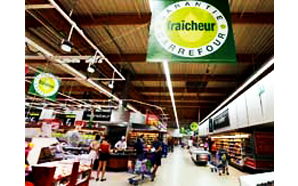Is Carrefour making a tactical retreat?
Vjmedia Works | May 13, 2014
With just five cash & carry stores and no concrete expansion plans, the French group is believed to be rethinking its India strategy amid the changing political climate
 It's not often that Jean Noel Bironneau, the managing director of Carrefour India, makes public statements. So, when a few days ago, it came to light that he had told his employees not to pay attention to "rumours" about Carrefour's exit from India, much curiosity was generated about the French retailer's fate in the country. In spite of what Bironneau told his employees, industry sources and analysts are making a strong case for why it makes sense for the Euro 76-billion company to stay away from India - at least for now.
It's not often that Jean Noel Bironneau, the managing director of Carrefour India, makes public statements. So, when a few days ago, it came to light that he had told his employees not to pay attention to "rumours" about Carrefour's exit from India, much curiosity was generated about the French retailer's fate in the country. In spite of what Bironneau told his employees, industry sources and analysts are making a strong case for why it makes sense for the Euro 76-billion company to stay away from India - at least for now.Carrefour, the second largest retail chain in the world after America's Walmart, entered India with the aim of opening supermarket stores which in bureaucratese are called multi-brand retail outlets. But all it did was open a handful of cash & carry (official jargon for wholesale) stores. "It is still very much a multi-brand player, while cash & carry remains just a stop-gap arrangement for the group," a source says.
To be fair, several multinational retailers - Walmart, Carrefour and Tesco - are keen to get a slice of India's $600-billion retail pie through hypermarkets and supermarkets. But the sector was kept closed for foreigners till 2012. The argument was that foreign retailers would finish off small Indian grocers in no time with their predatory pricing. Most retailers, while lobbying the government to open up multi-brand retail, sought to get a toehold in the market through cash & carry stores.
Thus, Walmart has set up 20 stores in the country since 2009, even though there has been a freeze on expansion since the end of 2012. Walmart's Asia CEO, Scott Price, who will soon take up an international strategy role in the company, announced recently that the plan is to raise the count to 50 in the next four to five years. Walmart is also ready to kick-start an e-commerce initiative in its India wholesale business. Metro of Germany, the only multinational retailer which wants to remain a cash & carry company in India, is looking at 50 wholesale stores by 2020, as its global CEO, Olaf Koch, announced last week, up from 16 now.
In comparison, Carrefour is a small player. Its five stores in Delhi, Jaipur, Meerut, Agra and Bangalore reported losses of $17 million (around Rs 102 crore) on a turnover of Rs 190 crore in 2012. Since its entry in 2010, Carrefour is learnt to have invested a total of about Rs 300 crore in India. Many say Carrefour's strength is retail, not wholesale. India is the only country in Asia where Carrefour operates cash & carry stores. This shows that wholesale is not a part of the group's overall strategy for the emerging markets. Rather, it is a vehicle to stay invested in India.
"But the vehicle is proving to be expensive in the long run for the group," says an executive from a rival company - in terms of time, money and human resources. For instance, Bironneau is considered an achiever within the group, but he has been stationed in India in an attempt to make things work in multi-brand retail. Now with strong signals that the sector may be closed for foreigners, Carrefour may well decide to use Bironneau in a more meaningful job.
Changing political backdrop
The Bharatiya Janata Party is opposed to foreign investment in multi-brand retail. If surveys prove correct and a BJP-led government comes to power, international retailers are unlikely to be allowed to open stores in India in the near future. Although BJP's prime-ministerial candidate, Narendra Modi, has indicated that done deals, like the one between Tesco of the United Kingdom and the Tata group for opening stores in Maharashtra and Karnataka, will not be struck down, there won't be room for new proposals in the sector.
When asked whether BJP would look at a liberal approach on multi-brand retail in the long term, Arun Jaitley, who may well become the finance minister in the Modi government, told this newspaper: "Before that long term comes, India must be ready for low-cost manufacturing. If your own products cost more than products in (foreign-owned) multi-brand outlets, you will be selling Chinese goods. Policies should be linked to India's capacity."
In this political backdrop, Carrefour must have realised its wait for setting up multi-brand retail stores will be longer than it had anticipated, according to an analyst who does not want to be named. With just five cash & carry stores in India so far and no concrete expansion plan for the market, the French group is believed to be reviewing its business strategy in the country. A review could include an exit, at least two people close to the development say. However, when contacted, Carrefour regional director Franck Kenner says: "At this point of time, we will not be able to comment on anything."
Carrefour began in India about seven years ago with sourcing and procurement, a business that is estimated at Rs 800 crore to Rs 1,000 crore a year. Bironneau had in fact said way back in 2010 that its sourcing business from India, for exports to Europe and elsewhere in Asia, had the potential to grow many times over. So, even if the group curtails its cash & carry operations or makes a complete exit, Carrefour is likely to continue sourcing from India. An estimated 500 to 600 persons are directly and indirectly working with the company for the sourcing business in the country.
Cash & carry is much smaller in scale for Carrefour, with less than 100 people on its rolls. Sources close to the development say the group is in the process of reducing its workforce across its wholesale store operations. The company had refused to comment on the matter of downsizing, but if it's true it could well be an indication of the business mood within the group.
Exiting from a non-performing market is not new for Carrefour. It has left Malaysia, Singapore, Indonesia and Greece, among others, either because of economic slowdown or poor business.
Earlier this year, Carrefour group CEO Georges Plassat had come to India on a brief visit, triggering the talk of a deal with an Indian partner. Yet, it hasn't formed any partnership so far - neither for cash & carry nor for multi-brand retail. It is believed to have been in talks with Sunil Mittal and Kishore Biyani, but the talks have collapsed. It is believed to have spoken to the Shoppers Stop group as well, but those talks failed as well. That's another sign of things not working out for the French chain in India at this point, an industry expert says. So perhaps, it's weighing the option of selling its cash & carry business in India completely or partially, and then returning once foreign investment in multi-brand retail is a real possibility.
Advertisement








